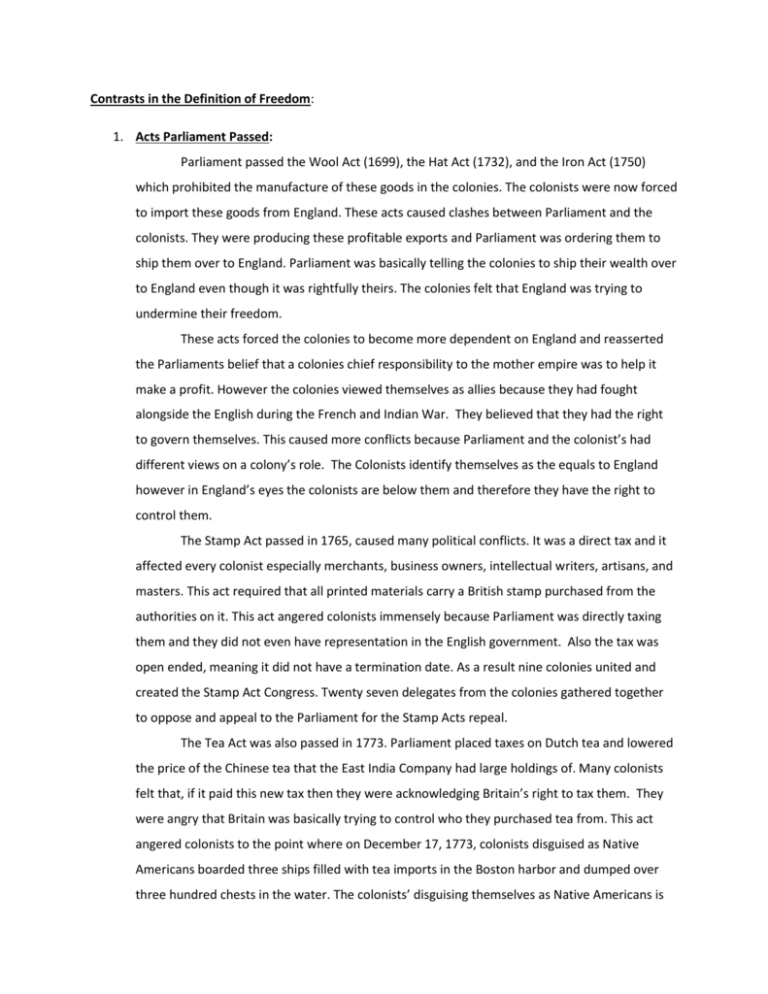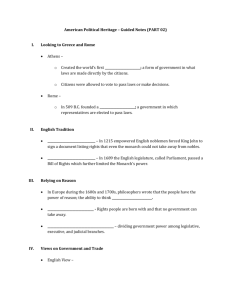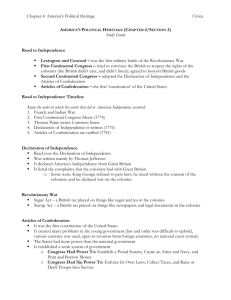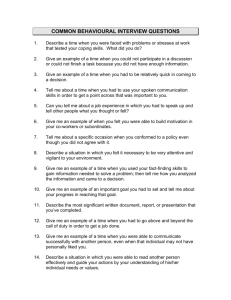Contrasts in the Definition of Freedom - lehman-classes
advertisement

Contrasts in the Definition of Freedom: 1. Acts Parliament Passed: Parliament passed the Wool Act (1699), the Hat Act (1732), and the Iron Act (1750) which prohibited the manufacture of these goods in the colonies. The colonists were now forced to import these goods from England. These acts caused clashes between Parliament and the colonists. They were producing these profitable exports and Parliament was ordering them to ship them over to England. Parliament was basically telling the colonies to ship their wealth over to England even though it was rightfully theirs. The colonies felt that England was trying to undermine their freedom. These acts forced the colonies to become more dependent on England and reasserted the Parliaments belief that a colonies chief responsibility to the mother empire was to help it make a profit. However the colonies viewed themselves as allies because they had fought alongside the English during the French and Indian War. They believed that they had the right to govern themselves. This caused more conflicts because Parliament and the colonist’s had different views on a colony’s role. The Colonists identify themselves as the equals to England however in England’s eyes the colonists are below them and therefore they have the right to control them. The Stamp Act passed in 1765, caused many political conflicts. It was a direct tax and it affected every colonist especially merchants, business owners, intellectual writers, artisans, and masters. This act required that all printed materials carry a British stamp purchased from the authorities on it. This act angered colonists immensely because Parliament was directly taxing them and they did not even have representation in the English government. Also the tax was open ended, meaning it did not have a termination date. As a result nine colonies united and created the Stamp Act Congress. Twenty seven delegates from the colonies gathered together to oppose and appeal to the Parliament for the Stamp Acts repeal. The Tea Act was also passed in 1773. Parliament placed taxes on Dutch tea and lowered the price of the Chinese tea that the East India Company had large holdings of. Many colonists felt that, if it paid this new tax then they were acknowledging Britain’s right to tax them. They were angry that Britain was basically trying to control who they purchased tea from. This act angered colonists to the point where on December 17, 1773, colonists disguised as Native Americans boarded three ships filled with tea imports in the Boston harbor and dumped over three hundred chests in the water. The colonists’ disguising themselves as Native Americans is very important because it’s a turning point; colonists no longer view themselves as Englishmen but Americans. They are beginning to gain a national identity and are starting to separate themselves from their mother country. Parliament passed the Coercive acts to punish the city. It closed the port until the city paid them back for the loss of revenue. Also the Parliament now gave British commanders the power to lodge soldiers in private homes. These acts caused the colonies to unite together against Britain who they felt was seriously trying to undermine their freedom. Colonists were further outraged when Parliament passed the Quebec Act which gave the Roman Catholics there the same rights as the Protestants who lived in the thirteen colonies. Tensions ran even higher because colonists were upset because their rights were being restricted, while the Roman Catholics were receiving more rights. These Acts severely damaged relations between Britain and America. The colonists felt that Britain was infringing upon their freedom and they grew tired of it. The Acts limited the colonies economical freedom and made them even more dependent on England. The colonists thought they were allies to England while in Parliament’s opinion they were subordinates to the crown. Their job was to help the mother country earn money. The acts caused the colonies that once thought they were separate entities unite together. The colonists formed a Second Continental Congress because of the acts and declared their independence from England. 2. Ben Franklin-Observations Concerning the Increase of Mankind, Peopling of Countries, etc. In Benjamin Franklin’s pamphlet, he primarily wrote about who he felt belonged in the colonies. He felt that the only true Caucasian people were the Saxons and the English. He felt other Europeans were not Caucasians because they had a swarthy complexion. Slaves and Germans were a danger to the American society because he worried that the large German population would not adopt American culture and instead assimilate the Americans. Because slaves did all the intensive labor their master’s children were becoming lazy and spoiled. He felt that slaves destroy white children’s sense of work and industry and in his opinion good work ethic offered people freedom. According to Franklin the British were superior and instead of increasing the population of the blacks and tawny, there should be a population increase of the British and the Native Americans. He felt that some populations were better suited for freedom than others and if you gave those who were not suited then they would abuse it. Freedom should be given to those could use it correctly. In his opinion, in order to receive freedom you had to fit the mold. Blacks, Asians and all Europeans except the British did not fit the mold and they did not belong in America. 3. The Declaration of Independence( liberalism’s role in the declaration) The Declaration of Independence was written by the delegates of the Second Continental Congress. America declared itself an independent nation on July 2, 1776. The Congress claimed that they had the right to get rid of the English government because Parliament was not protecting the colonists’ rights. The delegates felt that the governed made a social contract with its government and if it was not upheld then they had the right to abolish or alter it. In England, however the government was permanent. The government received its power from the people and it could be taken away from if the government failed to protect their rights. The Declaration also depicted the shift in the idea of where a person received his freedom from. According to the English, a person received his freedom from the law however the colonists now felt that they received their freedom from nature and God. Liberty became a universal entitlement instead of a privilege. Mankind was entitled to Life, Liberty and the pursuit of happiness according to the declaration. The delegates felt that the governed gave up some of its rights to the government and the government had to secure their rights not deny them. The Declaration also indicated the shift from the idea that there was a hierarchical society and that others enjoyed more liberties than others. The Declaration stated that all men were equal (really only white landowners). This was a new idea, because England’s government was based on inequality. People were not equal, some people enjoyed more rights than others. The Declaration was not created on a whim. The Congress decided that declaring independence was its only option if it wanted to be free. Parliament was continuing to restrict the colonies freedom and their plea to George II had fallen on deaf ears. The colonies economy was falling apart because it could not manufacture virtually any goods. The relations between England and America were deteriorating. The local elites in the colonies resented Parliament because they were threatening their authority. The Declaration of Independence showed another major shift in the American definition of freedom as the rights of mankind not just Englishmen. 4. The Revolutionary War- Americans believed that England was a tyrant and that it was taking away their freedom. They wanted equality and the power to govern themselves and they felt the only way to attain this was to become its own independent nation. However the Revolutionary War did not guarantee equality to all people living in America, slaves, women and Native Americans freedoms were still restricted. The war only established freedom for white men. In fact it only threatened Native American freedom. White settlers were already encroaching on Native American land and the Indians knew that if America won the war then they would lose even more land because Americans would claim control over the land. Native Americans tried to remain neutral however tribes still split into pro English and pro American factions. After the war Native Americans were forced to give up even more land and were forced into New York, the Ohio Valley and the southern backcountry. The Revolutionary war caused freedom to become a major word in Native American vocabulary. Freedom to them meant defending their own independence and preserving control over their land. At first the war did not mean anything to the slaves because the war would not change their status, they were still property and had no voice in their government. However when Lord Dunmore’s 1775 proclamation promised slaves freedom if they joined the British army, thousands of slaves escaped and joined British troops. The British encouraged slaves to escape because they needed the extra support and because they knew the southern economy depended on slaves and if they escaped then the economy would be disrupted. Initially George Washington refused to allow black recruits in his army but he changed his mind after Dunmore’s proclamation. Slaves joined state militias and fought in intergraded militias alongside whites. Because Rhode Island’s population primarily consisted of slaves, it offered slaves their freedom if they enlisted. Rhode Island formed black regiment. Southern colonies excluding South Carolina and Georgia enlisted blacks free and enslaved to fight. Although they were not promised their freedom overtly, many did gain their freedom after the war. The Revolutionary War offered slaves bargaining power. It gave them an opportunity to gain their freedom. African Americans tried to get Caucasian Americans to understand that freedom was a universal entitlement and they should not be denied theirs. Slavery stripped them of all their rights. They wanted the Caucasians to live up to their decree that liberty was a universal entitlement. However many patriots argued that white freedom was only possible with black slavery because slaves provided Caucasians with economic freedom. Even though women actively participated in the war by raising funds for the troops, making homespun goods and passing along information about where the British army was moving to, their roles did not really change after the war. However more women began to become educated about political affairs and began to participate in discussions. Women were slowly becoming more involved in politics which was traditionally seen as a male’s realm. The Revolutionary War did not bring any changes to women’s rights. Their husbands still had control over their person, property and choices. 5. The treaty of Paris(1783) The treaty recognized American independence and gave the U.S. control over the land between Canada and Florida and east of the Mississippi River. However it also removed the British from the territory which was bad for the Native Americans because the British allowed the Native Americans to retain their land. Now the Americans controlled the land and they planned on moving into the territory and establishing more states. 6. Articles of Confederation Congress wrote the first constitution in 1777, it was called the Articles of Confederation. The constitution was ratified in 1781. In the Articles of Confederation, the state held more power than the national government. The delegates feared a centralized national government which they felt for certain would result in a tyranny similarly to what happened to Britain. The Articles of Confederation was more like a firm league of friendship instead of a common government. The thirteen states still retained their sovereignty. State delegates did not want to give up any of their power however the national government managed to get some states to give up their land claims in the west (VA, PA and CT) and allow the government to control it. The Articles of Confederation did not establish a judiciary or executive branch. The national government was given the power to declare war, conduct foreign affairs, coin money and make treaties with other governments. However it could not levy taxes or regulate commerce. In order to pass laws nine votes had to be in favor. Every state was allowed one vote but they could send any amount of representatives. The national government had to rely on the states to help it bring in revenue and pay off the large war debt. However when the national government asked the states for funds to pay off its debt, it barely received any money because the states had their own debts to clear. The national government decided to sell western lands to bring in more revenue. The Articles of Confederation only lasted seven years (1781-1788) because it was ineffective. The national government’s powers were too limited had democracy became too excessive. There had to be a balance. 7. State constitutions The state constitutions had many differences such as voting rights. Voting rights varied from state to state. In order to vote in Massachusetts, South Carolina, New Jersey or Virginia you had to meet property qualifications. In other states such as Pennsylvania, you had to be over twenty one and had to pay taxes to vote. Vermont was the only state that expelled property and taxpaying qualifications for voting. But the state constitutions generally expanded the amount of people allowed to vote. Men with less property assumed political offices. However, southern states were less democratic and their legislatures were dominated by gentry which kept the hierarchy in place. All the states excluding Pennsylvania, Georgia and Vermont, had two house legislatures. The states where property qualifications were dropped signified the end of colonies restricting voting rights to those who were “economically independent” because they owned land. Although the state constitutions were very different from each other they had one thing in common. All states granted people their religious freedom. 8. Constitution A new constitution was written because the Articles of Confederation was a complete failure. Delegates realized that democracy could be excessive. The definition of liberty has once again changed, now liberty needs authority to regulate it and make laws. Delegates felt that if a new constitution was not created then an anarchy or monarchy would occur. The Articles of Confederation did not help pay off the national government’s debt. The national government needed more power. The new Constitution established three branches of government: the judiciary, the executive branch and the legislature. During the meeting three plans were proposed. In the end the delegates decided to use the Connecticut Plan. It proposed that a two house legislature be established with a house of representatives and the senate. The Constitution is based on two principles: federalism and the check and balances system. The Constitution gave Congress the power to levy taxes, regulate commerce, declare war, borrow money, and deal with foreign nations and Native Americans. The states power was also limited. States could not issue money, impair contracts, interfere with interstate commerce and levy import and export duties. The checks and balances system was created to ensure that the balance of power between the branches of government were equal. For example the congress can make laws but the president can veto them. The delegates did not trust the ordinary men. They felt that they did not fully understand the government and that they could ruin it. They placed limits on democracy because of their fears. Most elections were indirect; the House of Representatives was the only part of the government where the people directly elected them. The senators were elected by the state assemblies. Representatives were elected every two years so they had to do their job well in order to get re-elected however senators were elected every six years and could consider things more. The senators acted as blocks. The president and the vice president were not elected by popular vote instead they were elected by the Electoral College. 9. The Bill of Rights Most people felt that the bill of rights were meaningless however the Anti-federalists felt that the Constitution did not defend their rights effectively so James Madison wrote the Bill of Rights and presented it to congress. Madison felt that the checks and balances system was more important and that amendments could not predict the ways Congress might function in the future. The Bills Of Rights were generally ignored during this time. People already knew they were granted the right to practice their religion freely, bear arms, freedom of speech and assembly, etc. The Bill of Rights was created so satiate the Ant-Federalists so they would stop complaining. The Bill of Rights just stated what the inalienable rights that the people could enjoy without governmental interference. 10. Thomas Jefferson vs. Alexander Hamilton’s differing views on freedom Thomas Jefferson and Alexander Hamilton both had different views on which direction America’s future was headed to. Alexander Hamilton felt that America should become a powerful commercial republic. He felt that ‘city air breeds free’. He meant that a person received true freedom in cities because cities offered endless opportunities. Hamilton believed in meritocracy, meaning that people with merit should run the society. He felt that those who rose the highest were the best and therefore were qualified to run the country. Alexander H. felt that American freedom meant the right to compete. Life was a competition and if you worked hard then you would rise if not keep trying or follow those who are rising. Alexander Hamilton’s supporters included financiers, manufacturers and merchants. They formed a political party named the Federalists. The Federalists were merchants, lawyers and established farmers who grew cash crops such as indigo, tobacco, rice, etc. They were the elitists of the society. Federalists believed that America had a commercial future. They wanted to ally themselves with Britain because they wanted to build positive foreign relations with the country because of trade. Britain produced most of the goods America imported. Britain also controlled most of the West Indian market. It was one of the strongest empires of the world during this time and it was logical to try to become an ally Britain. Thomas Jefferson had a completely different view from Hamilton. In his opinion America’s future was in the country and should be based on agriculture. He wanted to establish a more rural society. He envisioned America to be a republic where yeoman farmers were independent and could support their families. Yeoman farmers would be completely independent from the cash economy. He did not want to promote manufacturing or urban growth. When Alexander Hamilton, the secretary of treasury, proposed that the national government pay off all the states debts, he was met with opposition from Thomas Jefferson, the secretary of state. Alexander Hamilton also wanted to establish a national bank which Jefferson also opposed. Jefferson felt that if a national bank was established and if the government assumed state debts then the country would become like England. Hamilton and Jefferson were able to reach a compromise. Jefferson would allow the national government to solve the debt if the capital was moved to the south on the Potomac River between Maryland and Virginia. Hamilton agreed because it did not matter to him where the capital was. Jefferson wanted the capital to be moved because he wanted to balance the power between the north and the south. New York was the political capital and it was becoming the financial capital as well. Jefferson feared that the north would have too much power. He wanted the south to have the political power. Jefferson was an anti-Federalist; his supporters included wealthy southern planters, ordinary farmers, etc. They formed the Democratic - Republican Party in opposition to the Constitution, which they felt undermined true freedom because it had a centralized government. The Democratic-Republicans had more faith in self government and felt that the state and the local governments should have more power than the national government. They felt that the power should not be concentrated on the elites. Also the Democratic- Republicans felt that the U.S. should establish good foreign relations with France because it was the only republican country in the east. They felt that France shared more similar political and philosophical views to America than Britain. Both men had different views over where America’s future should lie. This lead to a split and the first political parties are formed. The Northern states think that America had a commercial future while the southern states felt that America had an agricultural future. Before delegates were arguing over how the government should look, now they are arguing over who should control it. When the Federalists were in power in the government they tried to pass laws to destroy the Democratic Republicans. Congress passed three acts, The Naturalization Act, the Alien Act and the Sedition Act. The Naturalization Act extended the amount of years an immigrant had to live in America before he could petition for citizenship. Immigrants had to live in America for fourteen years before they could be qualified to become citizens. Congress passed this act because most Democratic-Republicans were immigrants. In 1796, the Alien Act was passed. This act gave the government the right to deport immigrants who they felt were a danger to the America. Congress also passed the Sedition Act in 1798, which prohibited public assemblies and the press (especially the Republican press) from printing anything negative about the government. If you criticized the government then you would be prosecuted. John Adams, the president at the time felt that these acts were going too far and attempted to veto them however Alexander Hamilton pressured Congress and they over ruled him. This led to a split in the Federalist Party. The more modest Federalists sided with Adams while the radicals sided with Alexander Hamilton and Congress. This split lead to the end of the Federalist Party. 11. Louisiana Purchase Thomas Jefferson purchased the Louisiana territory from France in 1803. Thomas Jefferson wanted to establish an agricultural society however in order to do that he needed transportation and land. America had already received permission from Spain, who had gained control over the territory, to use New Orleans to store their goods as well as the river so that goods could travel through. However France retrieved the territory back from Spain because Napoleon Bonaparte’s brother was the ruler of Spain. This worried Jefferson because without New Orleans his vision could not come true and the Mississippi River would be useless. He sent negotiators to Paris to see if he could purchase New Orleans. They offered Napoleon ten million dollars. Napoleon told them that they could get the entire Louisiana territory if they gave him 15 million. Jefferson needed to act quickly so he purchased the territory before congress could review the decision. He completely overstepped his boundaries because the negotiators were only authorized to offer buy New Orleans and offer France ten million dollars, however this was a good bargain so he grabbed it Jefferson overstepped his boundaries for the sake of his vision for America. His views on a centralized government had not changed. Thesis statement- The contours of freedom have significantly changed during the course of American history from the eighteenth century to the nineteenth century. America went through many phases. As the years progressed the arguments changed from how our government should look to who controlled it and finally where America’s future lied.







